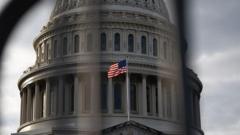As the curtains rise on the 119th Congress at the U.S. Capitol, a Republican-led chamber is set for a high-stakes session filled with pressing issues and intra-party dynamics. Lawmakers begin their work amidst a backdrop of unified Republican control, with Donald Trump back in the White House, a scenario not seen since 2017. Despite the Republican majority, the pathway ahead is fraught with potential disagreements that could test party cohesion.
1. **Leadership Challenges**
Republicans established a narrow majority in the House, leading to immediate challenges for Speaker Mike Johnson as he seeks re-election. Tensions arise from within his ranks, as several Republicans have shown hesitance in supporting him for another term. With the stakes high and margins thin, any dissent could result in a protracted election process similar to the contentious speaker battle in 2023. Johnson previously highlighted the urgency of uniting the party, stating, "We have nothing to spare."
2. **Confirmation of Cabinet Positions**
In the Senate, the focus now shifts towards confirming Trump's cabinet picks, an area anticipated to be contentious due to the diverse opinions about nominees. Among the notable candidates are Pete Hegseth for defense and Robert F. Kennedy Jr. for health, both of whom are likely to face scrutiny during confirmation hearings due to previous allegations and stances, respectively. Given recent national security threats, expedience in confirmations could become a priority as Senators aim to stabilize Trump's national security team.
3. **Tax Policy Revamp**
The expiration of key provisions from Trump's Tax Cuts and Jobs Act in 2025 looms large. The Republicans must navigate how to extend or revise these tax cuts amidst mixed opinions within the party. Balancing economic growth strategies with conservative resistance against increasing national debt poses a significant legislative challenge.
4. **Broader Republican Agenda**
Aside from tax legislation, a range of Republican priorities is expected to advance, tackling issues from immigration reform to military aid spending. The debt ceiling, a flashpoint for political contention, will require consensus-building strategies to avoid potential shut-down scenarios. Legislative packages may leverage reconciliation processes to avoid prolonged debates, allowing the congressional agenda to unfold more swiftly.
5. **Emerging Influences**
The past term underscored the rising influence of figures like Trump and tech entrepreneur Elon Musk, particularly in shaping legislation and party strategy. Their role in fostering a more aligned Republican agenda raises questions about the dynamics of influence within Congress. Concurrently, Democrats are regrouping, poised to leverage inter-party collaborations among progressive groups to counterbalance the Republican majority in upcoming elections.
As Congress embarks on this new year, navigating these complex issues will require astute leadership and considerable negotiation, as the balance of power and party unity will significantly dictate the legislative landscape ahead.






















